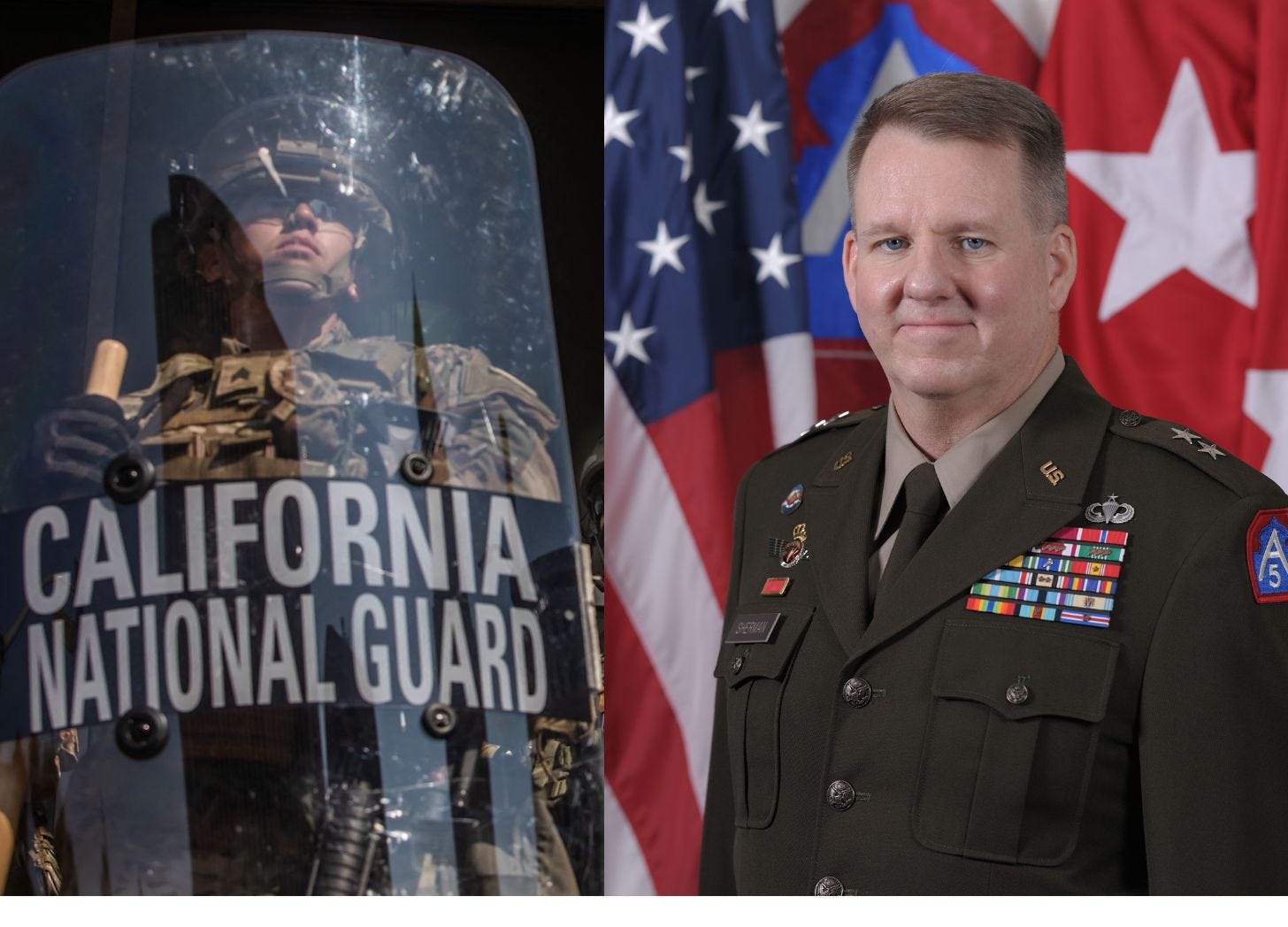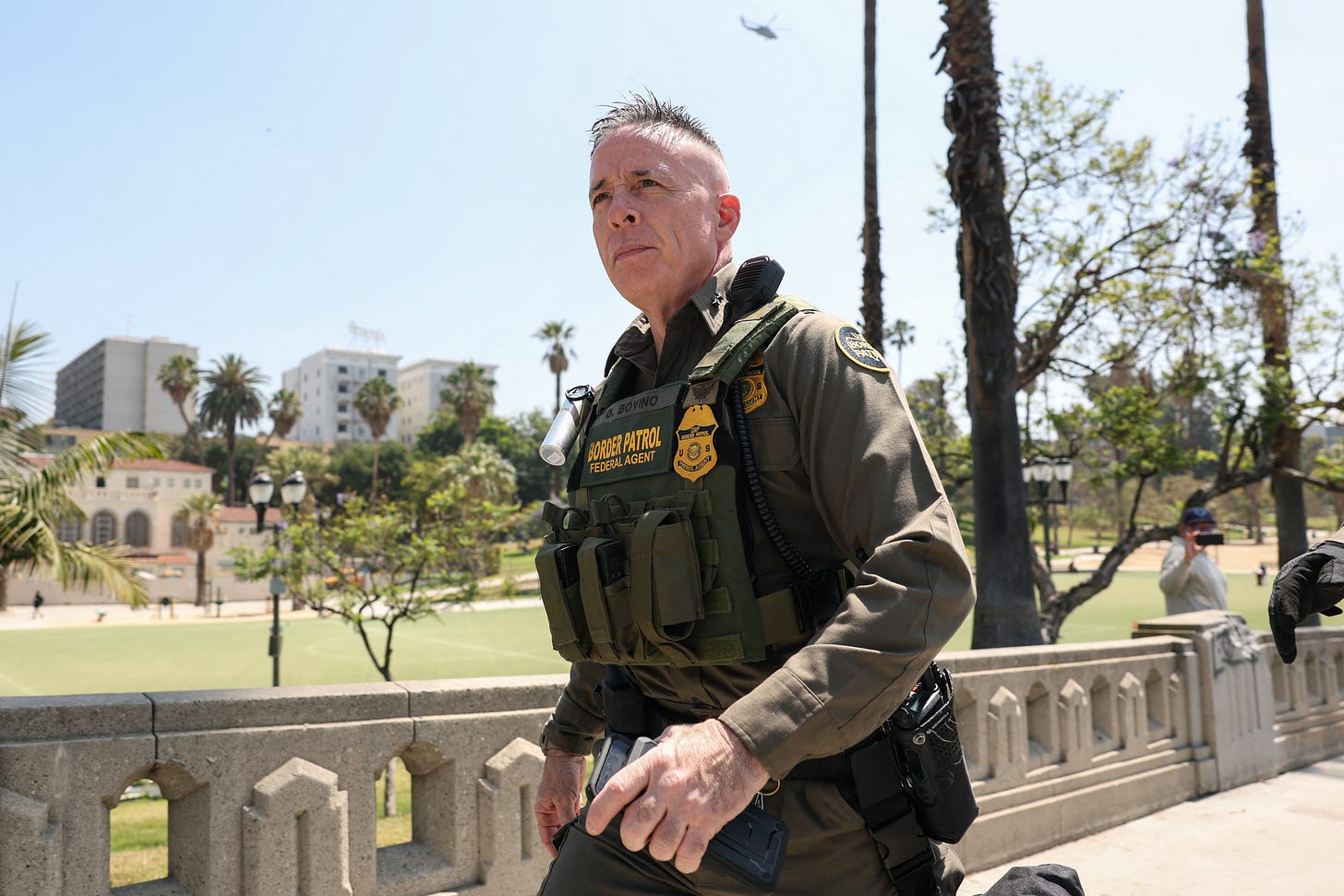General commanding troops in LA delivers, then revises, damaging testimony to Trump
Maj. Gen. Scott Sherman said no one at the Pentagon called the LA protests a "rebellion"—until he walked back that and other testimony the next day.

In front of the cameras, Trump talks about using the military to fight crime in major cities, but his lawyers keep saying in court that the troops aren’t used for law enforcement.
Support journalism that helps you navigate through the smoke and mirrors.
Major Gen. Scott Sherman, who commanded the task force deployed on the streets of Los Angeles, delivered testimony undermining the legal underpinnings of Donald Trump’s decision to deploy the National Guard in the nation’s second-largest city.
Then, the general walked most of it back the next day.
Sherman is the only witness to testify for both the state of California and the Trump administration in their legal battle over whether the administration violated the Posse Comitatus Act in its monthlong deployment of troops in the City of Angels.
Watch my Day One recap with Michael Popok here.
“Larger than the entire force sent to Afghanistan”
Sherman’s testimony falls in the context of a case brought by Gov. Gavin Newsom accusing the Trump administration of violating the Posse Comitatus Act, an 1878 law barring the military from engaging in civilian law enforcement. The government of California says the Trump administration did just that by deploying nearly 5,000 National Guard members and Marines as a “standing army” into the nation’s second-largest city for months.
“That’s larger than the entire force sent to Afghanistan in the three months following Sept. 11, 2001,” California Deputy Attorney General Meghan Strong remarked in court.
During both days of testimony, Sherman acknowledged that Task Force 51, behind the California deployment, must follow the Posse Comitatus Act, and he believed it did. On the first day, however, Sherman undermined some of the legal justifications for some of the Trump administration's actions.
On Monday, Sherman testified that nobody at the Pentagon characterized the LA protests as a “rebellion,” a significant concession because Trump’s deployment rests in part on the claim that it is. Sherman also revealed that he objected to one of the most controversial operations since troops landed in Los Angeles: the “Excalibur” operation in MacArthur Park, an iconic location that one city council member likened to the “Ellis Island of the West Coast.”
For lodging that objection, Sherman said that a civilian Trump official questioned his loyalty to the United States, despite his 33 years of service to the country in the military. The civilian Trump official who tarred the decorated general was Border Patrol sector chief Gregory Bovino, whose star rose in the administration for a raid that he claimed targeted dozens of criminals — but which a local news outlet uncovered led to the arrest of 78 people, all but one of whom had no criminal record.

California’s deputy attorney general called the extreme reaction to Sherman’s objection telling.
“That sort of reaction makes clear that the federal government is not concerned with abiding by the law,” Strong said.
Sherman said that internal documents assessed a low threat of property damage at MacArthur Park, but the Department of Defense routinely deployed troops even when the government saw little risk because tensions could always escalate.
“Constitutional exception”
On Tuesday, however, Sherman then walked back much of his most damaging testimony when the Justice Department recalled him as the Trump administration’s sole witness.
When questioned by the federal government, Sherman took pains to “clarify” that the Department of Defense leaders and soldiers were aware that Trump characterized the protests as a “rebellion” in a memorandum. On Day Two, Sherman suddenly said that the MacArthur Park operation went above him because the overall threat assessment was high, and he insisted that all of the troops under his command followed the law, including the Posse Comitatus Act.
Most significantly, Sherman kept insisting that each seeming participation in civilian law enforcement fell under the category of a so-called “constitutional exception.”
For example, in June, Marines detained 27-year-old Army veteran Marcos Leao who crossed yellow tape while visiting the Department of Veterans Affairs, restraining him behind his back with plastic flexicuffs. Sherman justified the apprehension as part of the overarching mission of helping federal law enforcement who were unavailable during the lunch hour.
Sherman generally acknowledged the undisputed acts at issue in the case: Military personnel set up security perimeters, engaged in traffic control, and detained civilians, but he said that those incidents fell under the supposed “exception” because of their objective of protecting federal property and law enforcement.
Skeptical, Senior U.S. District Judge Charles Breyer, who has been on the bench since 1997, asked Sherman to explain the phrase because he had never heard of it.
Sherman, who is not a lawyer, confessed that he didn’t know where it came from, except from up the chain of command.
“This was the advice that I was given was that we were allowed to do these four things because it was in line with what the President was directing, what the Secretary of Defense was directing,”
“Military crusade”
With witness testimony now, the three-day trial is expected to end on Wednesday with oral arguments on the law.
Judge Breyer appeared to be disturbed about the broad powers the government has been claiming under this undefined exception.
“Where are the limits? Where are the limits?” Breyer asked twice with a booming voice toward the end of Tuesday’s proceedings, referring to constraints on the government’s power to send the military on civilian streets.
The Justice Department’s lawyer did not offer any limitation, only justifying the deployment with individual incidents of violence toward police in California.
Wednesday’s oral arguments will also delve into the legal fine points of the Posse Comitatus Act, a criminal law that carries a potential prison term of two years. California is invoking it in a civil context, seeking an order blocking the government from using the military for civilian law enforcement, and Trump’s Justice Department argues it can’t be used for that purpose. The Golden State disagrees.
"Plaintiffs ask that the court issue a permanent injunction and bring a halt to the defendants’ military crusade across this state," Deputy Attorney General Strong said.
Repeatedly describing the Trump administration’s National Guard deployment as an “occupation,” Strong added: “President Trump seems to see the military as his own personal army to advance his agenda and enforce domestic law.”
At one point, Strong unpacked the symbolism behind the “Excalibur” code name behind the MacArthur Park operation — evoking King Arthur’s sword symbolizing the divine right of rule.
“That is exactly the kind of standing army the Founding Fathers feared,” she said.
The trial will cap off with oral arguments on Wednesday.
Correction: The story has been updated to correct a typographical error misstating the general’s professional background.



Thanks, Adam. Clearly the administration has a lot banked on this case since it will set a precedent for other cases across the country. It is terrifying to hear how quickly Sherman’s initial testimony was modified. Can anyone be trusted?
Scary that. Does this mean we can't depend on the military to defend the Constitution? Just following orders? Where did I hear that before.